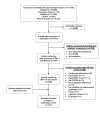Measurement Properties of Existing Patient-Reported Outcome Measures on Medication Adherence: Systematic Review
- PMID: 33034566
- PMCID: PMC7584986
- DOI: 10.2196/19179
Measurement Properties of Existing Patient-Reported Outcome Measures on Medication Adherence: Systematic Review
Abstract
Background: Medication adherence is essential for improving the health outcomes of patients. Various patient-reported outcome measures (PROMs) have been developed to measure medication adherence in patients. However, no study has summarized the psychometric properties of these PROMs to guide selection for use in clinical practice or research.
Objective: This study aims to evaluate the quality of the PROMs used to measure medication adherence.
Methods: This study was guided by the PRISMA (Preferred Reporting Items for Systematic Review and Meta-Analysis) guidelines. Relevant articles were retrieved from the EMBASE, PubMed, Cochrane Library, Web of Science, and CINAHL (Cumulative Index to Nursing and Allied Health Literature) databases. The PROMs were then evaluated based on the COnsensus-based Standards for the selection of health Measurement Instruments (COSMIN) guidelines.
Results: A total of 121 unique medication adherence PROMs from 214 studies were identified. Hypotheses testing for construct validity and internal consistency were the most frequently assessed measurement properties. PROMs with at least a moderate level of evidence for ≥5 measurement properties include the Adherence Starts with Knowledge 20, Compliance Questionnaire-Rheumatology, General Medication Adherence Scale, Hill-Bone Scale, Immunosuppressant Therapy Barrier Scale, Medication Adherence Reasons Scale (MAR-Scale) revised, 5-item Medication Adherence Rating Scale (MARS-5), 9-item MARS (MARS-9), 4-item Morisky Medication Adherence Scale (MMAS-4), 8-item MMAS (MMAS-8), Self-efficacy for Appropriate Medication Adherence Scale, Satisfaction with Iron Chelation Therapy, Test of Adherence to Inhalers, and questionnaire by Voils. The MAR-Scale revised, MMAS-4, and MMAS-8 have been administered electronically.
Conclusions: This study identified 121 PROMs for medication adherence and provided synthesized evidence for the measurement properties of these PROMs. The findings from this study may assist clinicians and researchers in selecting suitable PROMs to assess medication adherence.
Keywords: medication adherence; patient reported outcome measures; reliability and validity; systematic review.
©Yu Heng Kwan, Si Dun Weng, Dionne Hui Fang Loh, Jie Kie Phang, Livia Jia Yi Oo, Dan V Blalock, Eng Hui Chew, Kai Zhen Yap, Corrinne Yong Koon Tan, Sungwon Yoon, Warren Fong, Truls Østbye, Lian Leng Low, Hayden Barry Bosworth, Julian Thumboo. Originally published in the Journal of Medical Internet Research (http://www.jmir.org), 09.10.2020.
Conflict of interest statement
Conflicts of Interest: None declared.
Figures
References
-
- Dal-Fabbro AL. Adherence to long term therapies: evidence for action. Cad. Saúde Pública. 2005 Aug;21(4):1297–8. doi: 10.1590/s0102-311x2005000400037. - DOI
-
- Sabaté E. editor. , ed. Adherence to Long-Term Therapiesvidence for Action. Geneva, Switzerland: World Health Organization; 2003. p. E.
-
- Lee S, Raamkumar AS, Li J, Cao Y, Witedwittayanusat K, Chen L, Theng Y. Reasons for primary medication nonadherence: a systematic review and metric analysis. J Manag Care Spec Pharm. 2018 Aug;24(8):778–94. doi: 10.18553/jmcp.2018.24.8.778. doi: 10.18553/jmcp.2018.24.8.778. - DOI - DOI - PMC - PubMed
Publication types
MeSH terms
Grants and funding
LinkOut - more resources
Full Text Sources
Medical
Miscellaneous


